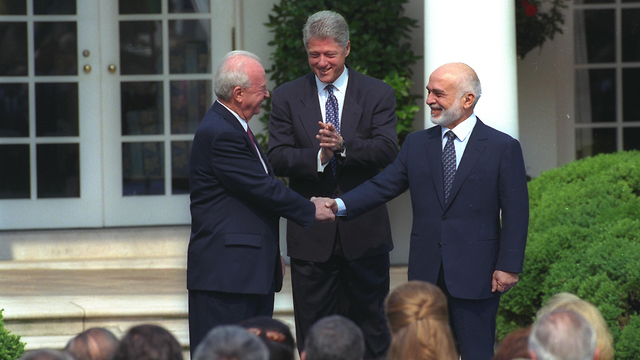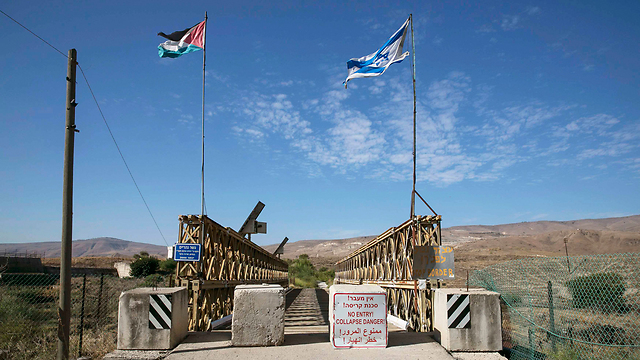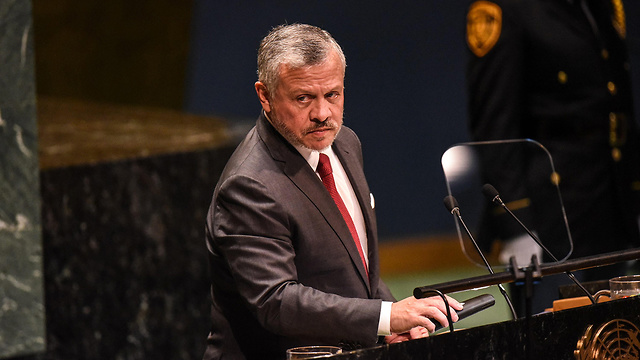The things I hear coming out of Jordan are dismaying.
"Twenty-five years have passed and the relationship between our countries remains murky and bleak", tells me one of the people involved with the 1994 peace agreement between Jordan and Israel.
"Our cooperative security efforts have never been stronger, but pressures are increasing on to make a more expansive peace with Israel", he adds.
Our Jordanian friend talks about peace in a frustrated and disappointed way, a peace which was promised to be "warm and true".
There is a new player on the field: Israel's attention is drawn towards Saudi Arabia, an adversary of Jordan.
If the attempts to bring the two countries come to fruition, Riyadh and Jerusalem will bring Amman and Cairo into a strong and unified Persian Gulf front against Iran.
But for now, king Abdallah uses the recent border disputes along the Jordan River with Israel as punishment, demanding certain Israeli enclaves in Jordan to return to full Jordanian control.
Withstanding that, everything still seems to be in order: Israeli tourists are still going to Aqaba, Petra and even Amman.
But a worsening in the status que is apparent: Israelis – only Jews, not Israeli Arabs – are forced to bribe cab and transport drivers to take them across the Jordanian border.
From descriptions given by Israelis vacationing in Jordan, the splendid hotels of Aqaba act as if nothing has changed.
On the other hand, if you're in Amman, it's better for you to hide your Israeli identity and the prices for the short flights to Jordan have, for want of a better phrase, skyrocketed.
We can learn much about the current situation from the bitterness voiced by two retired Jordanian generals, who visited the Institute for National Security Studies in Tel Aviv.
With no events commemorating the 25th anniversary of the peace deal, their visit was essentially the only event.
These generals have watched Jordan's relationship with Israel even before the peace deal, and to this day maintain a tight link with us.
A ceremony commemorating the peace deal occurred in a fabulous hotel on the Jordanian side of the Dead Sea, where both sides mourned what has remained of it.
Not all is lost. We can try to start cooperating in our various cyber technology companies and inventions.
We are after all a world leader in the field and the young intelligent Jordanians are yearning jobs. So simple.
Only we need to do is appoint an Israeli contact to the Jordanian royal court – former Director of the Mossad Efraim Halevy for example, or senior Israeli Defense Ministry advisor Amos Gilad – someone who will keep an open line of communication, will conduct advisory talks in Amman and convey special requests from the king to Jerusalem.
Israel is already very familiar with Jordan's problems, problems that have been aggravated by the arrival of about a million and a half refugees from Iraq and Syria.
Added to this is Israel's decision to block the Jordanian intention to sell agricultural and consumer goods to the West Bank, a decision that has led to much frustration on their part.
An agreement could have been reached on the subject, but who cares?
The problems become clearer with the issue of compensation payment that was to be given by the Israeli government to the Jordan.
The compensations were supposed to be made as a result of the killing of two Jordanians - 17-year-old Mohammed al-Zawawdeh and Dr. Bashar Hamarneh - by a security guard for the Israeli embassy in Amman.
Al-Zawawdeh was were shot dead during a scuffle with an embassy guard in an Amman apartment.
Dr. Hamarneh was shot dead while trying to separate the two.
Then Israeli ambassador to Jordan Einat Schlein, who was smuggled back to Jerusalem following the incident, was further embarrassed during a needless meeting with Prime Minister Benjamin Netanyahu who decided to call the embassy guard a "hero".
Now there is a new ambassador, Amir Weissbrod, whose mission to the kingdom is no easy task.
In December 2009, then-Jordanian King Hussein gave an historic and exclusive interview to Ynet's sister publication Yedioth Ahronoth.
In that interview he said how devoted he was for peace and told of his willingness to shine a light on the usually clandestine relationship between the two countries.
Today, when we read the interview, what is left but to cry?






















